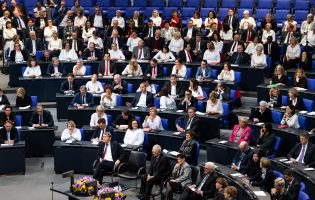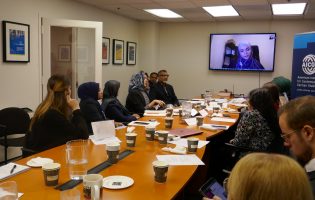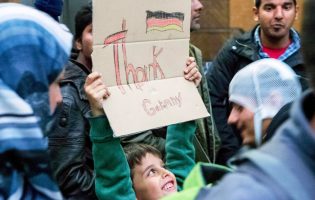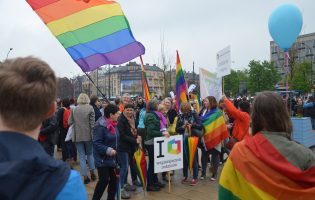Beverly Crawford, DAAD/AGI Research Fellow
AGI is pleased to welcome Beverly Crawford as a DAAD/AGI Research Fellow from mid-April to mid-June 2019. Beverly Crawford is Professor emerita of Political Science and Political Economy at the University …
Mariam Salehi, DAAD/AGI Research Fellow
AGI is pleased to welcome Mariam Salehi as a DAAD/AGI Research Fellow from mid-April to mid-June 2019. Dr. Mariam Salehi is a postdoctoral researcher at the Center for Conflict Studies, …

The Dealer’s Cards: How Gary Sternberg Has Made the Best of Them
Gerd “Gary” Sternberg was dealt a tricky hand. Born the son of a Protestant mother and a Jewish father in Cuxhaven, Germany on August 25, 1931, he experienced discrimination firsthand …
Recent Authors
AGI provides knowledge, insights, and networks as tools to solve the challenges ahead.
Support Our WorkEpisode 07: Muslim Women’s Experiences in Germany and the U.S.
Muslims have lived in Germany in significant numbers for decades; in 1961 the Federal Republic concluded an agreement with Turkey that would ultimately bring nearly a million Turkish workers to …

Necessary but Hardly Sufficient: Assessing a Century of Women’s Suffrage in Germany and the United States
Long before feminists began lobbying for affirmative action, gender mainstreaming, and quotas, suffragettes around the world presumed that the formula “add women, voting rights, and stir” would quickly transform their …

Muslim Women in Germany and the United States
Common and Complex Challenges Bringing together an interdisciplinary group of practitioners and experts from Germany and the United States, this workshop held on February 20, 2019, focused on the economic …
Dr. Lily Gardner Feldman to Retire from AGI
The American-German Institute (AGI) at Johns Hopkins University announces that Dr. Lily Gardner Feldman will be retiring at the end of February 2019. Dr. Gardner Feldman has served as Director …

A Doctor’s Mission: The Life and Work of Ernst Kisch
Read the stories of other Shanghai Jews Dr. Ernst Kisch was an opera-loving Viennese physician who was imprisoned in Dachau and Buchenwald for being Jewish. Upon his release from Buchenwald, …

Us versus Them: The Steady Narrative of “Othering” in Historical and Contemporary Debates in Germany and the U.S.
Germany and the United States today face rising anti-Semitism and anti-Muslim sentiment as nativist politics on both sides of the Atlantic gain not only traction, but also legitimacy. From the …






